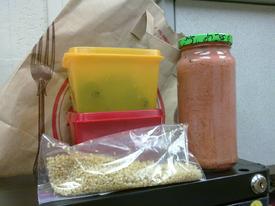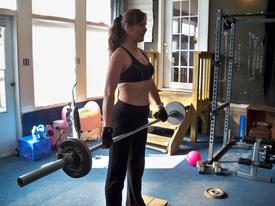Calories burned from strength straining

1Timothy4v8
Posts: 503 Member
A fitness trainer at my gym told me it's better to burn calories with weight lifting cause you will burn cals for day's later, does any one now how many I would burn and for how long after a work out it would burn?
0
Replies
-
What they meant is that muscle mass increases your metabolism. So you are burning more calories at rest then you would if you were to only do cardio.
Others know much more than me but I didn't want to leave you hanging. The point is that having lean muscle mass is important. Try to have a healthy mix of cardio and resistance training.0 -
It's extremely hard to calculate because it depends on how many sets of what exercises you do at what weight, how strong you already are and how good/bad your form is, and then the burn after your workout is variable by all the same factors and by person depending on how efficiently your body repairs muscle.
That being said, the Mayo Clinic gives approximate figures of 365, 455 and 545 calories per hour for a 160, 200, and 240 pound person respectively.0 -
strength straining is what I do.0
-
It's extremely hard to calculate because it depends on how many sets of what exercises you do at what weight, how strong you already are and how good/bad your form is, and then the burn after your workout is variable by all the same factors and by person depending on how efficiently your body repairs muscle.
That being said, the Mayo Clinic gives approximate figures of 365, 455 and 545 calories per hour for a 160, 200, and 240 pound person respectively.
thank you0 -
What they meant is that muscle mass increases your metabolism. So you are burning more calories at rest then you would if you were to only do cardio.
Others know much more than me but I didn't want to leave you hanging. The point is that having lean muscle mass is important. Try to have a healthy mix of cardio and resistance training.
no He told me that your body will burn cals after weight lifting for a couple days cause it needs energy to repair the muscles0 -
This is why I feel that calorie calculations are way off for strength training. For a typical session, it could be anywhere from 200 to 600 calories, normally. But, you continue to burn as you repair, it's not just about the effort expended in that moment. But, whatever. It's all just a SWAG anyways. The whole calorie thing is such BS I cant even believe we all follow it like it means anything. Lol.0
-
I have wondered about this too, but I am only 120 lb so I wish there were some kind of formula I could use to figure out what my variables are and go from there. Any websites I can check for this? I cannot afford a personal trainer, but I NEED to get stronger, and I'd really like to get credit for it on MFP lol
 0
0 -
strength straining is what I do.
i'm going to start referring to my bowel movements as strength straining.0 -
strength straining is what I do.
oh LAME I didn't even realize I spelled it like that, oppsy!0 -
It's almost impossible to guesstimate how many cals one might burn doing weight lifting. Odds are, however, that if you are seriously strength training, then you are needing extra calories in order to rebuild muscle. Unless you are obese or completely new to weight training, you can't really build muscle in a deficit.0
-
The whole calorie thing is such BS I cant even believe we all follow it like it means anything. Lol.
o_O0 -
It's almost impossible to guesstimate how many cals one might burn doing weight lifting. Odds are, however, that if you are seriously strength training, then you are needing extra calories in order to rebuild muscle. Unless you are obese or completely new to weight training, you can't really build muscle in a deficit.
why unless your obese? you don't need extra cals if you are lifting a LOT when you have extra fat?0 -
If you are obese, then you have enough surplus fat for your body to churn up and build muscle out of, even while eating a caloric deficit.
Edit: and by "a lot," I hope you mean "multiple sets of low reps at heavy weight," not "3 sets of 15 with the pink weights."0 -
Thank YOU and the MAYO clinic for that info !!0
-
Hey high metabolism isn't what it's cracked up to be. I have an EXTREMELY high metabolism and all it means is that I'm hungry more, get to eat a LOT more calories and have to, and did I mention, I'm always hungry?0
-
It's almost impossible to guesstimate how many cals one might burn doing weight lifting. Odds are, however, that if you are seriously strength training, then you are needing extra calories in order to rebuild muscle. Unless you are obese or completely new to weight training, you can't really build muscle in a deficit.
why unless your obese? you don't need extra cals if you are lifting a LOT when you have extra fat?
If I understand what I've read correctly, a person closer to goal weight needs extra calories because the body cannot access fat stores quickly enough. It will reap from the nearest available source, which could just as well be muscle as fat.
An obese person, or a person new to lifting, has an abundance of readily available fuel. The body can access these stores without resorting to burning muscle...for a while, anyway.
If I'm wrong, someone will be along in a minute to correct me!0 -
I'm gonna start at the beginning...
Essentially when you do strength training, you are creating microtears in your muscles. That's why you get sore. Over the course of the following few days, your muscle cells are multiplying to fill in those microtears, thus creating greater muscle mass. In order for the muscle cells to multiply, you need protein, which is the building blocks for the muscle cells, you also need water, and plenty of vitamins. The vitamins make it so your body can synthesize the protein you've eaten and turn it into muscle cells. I think of it as paying the workers in vitamins to build a building - or in this case SICK GUNS.
As far as calories burned, there are three parts to this process that involve calories being burned. First, it does take energy for your body to create the new muscle cells, energy means calories, so what your physical trainer said is true enough. Second, upon having increased your muscle mass, that muscle mass is able to carry out work, thus burning calories. (Increased muscle mass means higher efficiency at burning fat.) Third, keep in mind that our body burns a typical amount of calories in a given day simply from existing, circulating blood, breathing, all that. Having extra muscle mass increases this typical amount of calories burned per day from simply existing.
Since there are so many factors involved in this process, even if I could somehow measure or calculate the calories being burned due to just the replication of muscle cells, I honestly wouldn't log them and eat back those calories simply because I wouldn't trust the accuracy of the measurement or calculation.
I mean, under this logic, even a normal heart rate monitor isn't going to be perfect, because a fraction of the calories burned in a workout is due to "existing" and not the actual workout, because you are burning a steady amount of calories over time. That's why I don't eat ALL of my excersize calories back, just MOST of them.
Okay I have no idea if any of that made sense. I did my best though. I guess if your interested in seeing it how I see it give me a message or whatever. - Mary 0
- Mary 0 -
What they meant is that muscle mass increases your metabolism. So you are burning more calories at rest then you would if you were to only do cardio.
Others know much more than me but I didn't want to leave you hanging. The point is that having lean muscle mass is important. Try to have a healthy mix of cardio and resistance training.
no He told me that your body will burn cals after weight lifting for a couple days cause it needs energy to repair the muscles
What do you think metabolism is? It is your body maintaining and adapting to changes including muscle repair.
http://en.wikipedia.org/wiki/Metabolism0 -
If you are obese, then you have enough surplus fat for your body to churn up and build muscle out of, even while eating a caloric deficit.
Edit: and by "a lot," I hope you mean "multiple sets of low reps at heavy weight," not "3 sets of 15 with the pink weights."
B*** you wish you could lift like me haha0 -
It's almost impossible to guesstimate how many cals one might burn doing weight lifting. Odds are, however, that if you are seriously strength training, then you are needing extra calories in order to rebuild muscle. Unless you are obese or completely new to weight training, you can't really build muscle in a deficit.
why unless your obese? you don't need extra cals if you are lifting a LOT when you have extra fat?
If I understand what I've read correctly, a person closer to goal weight needs extra calories because the body cannot access fat stores quickly enough. It will reap from the nearest available source, which could just as well be muscle as fat.
An obese person, or a person new to lifting, has an abundance of readily available fuel. The body can access these stores without resorting to burning muscle...for a while, anyway.
If I'm wrong, someone will be along in a minute to correct me!
hmmmm... good to know, good to know. thank you 0
0 -
I'm gonna start at the beginning...
Essentially when you do strength training, you are creating microtears in your muscles. That's why you get sore. Over the course of the following few days, your muscle cells are multiplying to fill in those microtears, thus creating greater muscle mass. In order for the muscle cells to multiply, you need protein, which is the building blocks for the muscle cells, you also need water, and plenty of vitamins. The vitamins make it so your body can synthesize the protein you've eaten and turn it into muscle cells. I think of it as paying the workers in vitamins to build a building - or in this case SICK GUNS.
As far as calories burned, there are three parts to this process that involve calories being burned. First, it does take energy for your body to create the new muscle cells, energy means calories, so what your physical trainer said is true enough. Second, upon having increased your muscle mass, that muscle mass is able to carry out work, thus burning calories. (Increased muscle mass means higher efficiency at burning fat.) Third, keep in mind that our body burns a typical amount of calories in a given day simply from existing, circulating blood, breathing, all that. Having extra muscle mass increases this typical amount of calories burned per day from simply existing.
Since there are so many factors involved in this process, even if I could somehow measure or calculate the calories being burned due to just the replication of muscle cells, I honestly wouldn't log them and eat back those calories simply because I wouldn't trust the accuracy of the measurement or calculation.
I mean, under this logic, even a normal heart rate monitor isn't going to be perfect, because a fraction of the calories burned in a workout is due to "existing" and not the actual workout, because you are burning a steady amount of calories over time. That's why I don't eat ALL of my excersize calories back, just MOST of them.
Okay I have no idea if any of that made sense. I did my best though. I guess if your interested in seeing it how I see it give me a message or whatever. - Mary
- Mary
Thank yoou, yea that made a lot of sense, thank you for explaining it to me, I should have figured it would be to hard to find out how much it burns =(0 -
What they meant is that muscle mass increases your metabolism. So you are burning more calories at rest then you would if you were to only do cardio.
Others know much more than me but I didn't want to leave you hanging. The point is that having lean muscle mass is important. Try to have a healthy mix of cardio and resistance training.
no He told me that your body will burn cals after weight lifting for a couple days cause it needs energy to repair the muscles
There is often a misunderstanding about this. People think "oh, if I burn more calories for 36 hours after finishing exercise, that's better" without ever asking exactly how many calories that is.
Answer: not a huge amount. Or at least, not likely a huge amount. Research is all over the board on this subject and I don't think anyone really knows for sure. But let's say you burned 200 calories in a strength session and that raised your resting metabolism 10% for 36 hours (an unrealistically large number BTW, but I'm trying to prove a point). If you weighed 100 kg (220 pounds), that extra 10% would be 360 more calories over the next 36 hours. Sounds pretty f-ing awesome, right? That would be a total of 200 + 360 for the workout --560 altogether.
At 220 pounds, doing 45 min of cardio at a decent pace, you could easily burn 600-750 calories. And, you could do it again the next day, which you can't do for weight lifting.
This is not meant to be a knock against strength training. Strength training is absolutely critical for long-term weight loss. I can't think of any study that hasn't shown that strength training enhances any weight loss program.
My point is: don't get hung up on the calorie numbers, don't get sucked into all the goofy explanations you'll get about "raising metabolism", etc.
Just lift. We know it works.0 -
What they meant is that muscle mass increases your metabolism. So you are burning more calories at rest then you would if you were to only do cardio.
Others know much more than me but I didn't want to leave you hanging. The point is that having lean muscle mass is important. Try to have a healthy mix of cardio and resistance training.
no He told me that your body will burn cals after weight lifting for a couple days cause it needs energy to repair the muscles
There is often a misunderstanding about this. People think "oh, if I burn more calories for 36 hours after finishing exercise, that's better" without ever asking exactly how many calories that is.
Answer: not a huge amount. Or at least, not likely a huge amount. Research is all over the board on this subject and I don't think anyone really knows for sure. But let's say you burned 200 calories in a strength session and that raised your resting metabolism 10% for 36 hours (an unrealistically large number BTW, but I'm trying to prove a point). If you weighed 100 kg (220 pounds), that extra 10% would be 360 more calories over the next 36 hours. Sounds pretty f-ing awesome, right? That would be a total of 200 + 360 for the workout --560 altogether.
At 220 pounds, doing 45 min of cardio at a decent pace, you could easily burn 600-750 calories. And, you could do it again the next day, which you can't do for weight lifting.
This is not meant to be a knock against strength training. Strength training is absolutely critical for long-term weight loss. I can't think of any study that hasn't shown that strength training enhances any weight loss program.
My point is: don't get hung up on the calorie numbers, don't get sucked into all the goofy explanations you'll get about "raising metabolism", etc.
Just lift. We know it works.
yea that was something I wondered about, he said you will burn for longer but I thought how much though?
so yea I think I will do both, thank you for your reply 0
0 -
i burn about 500 calories in an hour. I weight 145lbs and i am 5'9". Just helping you...I find this out because I always wear my HRM in the gym.0
-
i burn about 500 calories in an hour. I weight 145lbs and i am 5'9". Just helping you...I find this out because I always wear my HRM in the gym.
thank you, maybe I should look into getting a HRM0
This discussion has been closed.
Categories
- All Categories
- 1.4M Health, Wellness and Goals
- 398.2K Introduce Yourself
- 44.7K Getting Started
- 261K Health and Weight Loss
- 176.4K Food and Nutrition
- 47.7K Recipes
- 233K Fitness and Exercise
- 463 Sleep, Mindfulness and Overall Wellness
- 6.5K Goal: Maintaining Weight
- 8.7K Goal: Gaining Weight and Body Building
- 153.5K Motivation and Support
- 8.4K Challenges
- 1.4K Debate Club
- 96.5K Chit-Chat
- 2.6K Fun and Games
- 4.8K MyFitnessPal Information
- 13 News and Announcements
- 21 MyFitnessPal Academy
- 1.6K Feature Suggestions and Ideas
- 3.2K MyFitnessPal Tech Support Questions









